CHUCK: Part IV, Pro Se Filing: Can You Hear Me Now?
"I begged my lawyer at the time to follow up on some of the facts of my case. He wouldn’t do it. He refused to do it. I begged him and others in his office for years and they wouldn’t listen."
This series of five posts (see Part I, Part II, and Part III) comes from Charles Ray Crawford, who goes by Chuck. Chuck was born and raised in Mississippi and is scheduled to be executed by that state on October 15. In this series, he reflects on his childhood, his faith that has gotten him through more than thirty years on death row, some of the evidence in his case that troubles the prosecutors’ narrative, and his experiences trying to convince his lawyers to pay attention to that evidence. You can also read these posts on The GOAT PoL and Humans Remain.
To sign a petition to stop Chuck’s execution and give him the chance to have a fair trial, visit the death penalty action website, here.

At my trial, my trial attorneys went for an insanity defense. I was adamant that I didn’t want them to do that, and they did it anyway. This meant that my trial lawyer had done no investigation; he focused only on the insanity defense, which works less than 1% of the time. I stood up and objected in trial; I told the judge I no longer accepted my lawyers—as far as I was concerned, they could go sit at the prosecutors’ table because they seemed to be working for them. When the judge said there was nothing he could do, I picked up my chair, took it ten feet away, turned it around, and set my back against the court. You can see my stated disagreement with my trial counsel, as well as the way my attorneys spoke of me, in this excerpt of the trial transcript. If you read page three of that linked excerpt, you would probably swear it was the prosecutor presenting his closing argument, not my attorney.
That was the beginning of what has felt like thirty years of struggling to get my attorneys to listen to me. I went through federal habeas for nine and a half years without meeting one of my lawyers. I never spoke to her. I couldn’t tell you what she looks like. To be fair, many federal attorneys just go off the record and think they don’t need to talk to clients. This is because you have to give the state courts opportunities to address any claims before they go to the federal courts, so the idea is that by the time you’re in federal court, lawyers should have everything they need in front of them. But sometimes people on death row have more information about their case, issues that their previous attorneys didn’t bring up in state court; if the federal attorneys were aware of these issues, they could request a stay and return your case to state court. But they would never know this if they didn’t talk to you. You only get one shot in federal court, and you want to make sure all your claims are in there, so yes, I think it’s important to meet. How do you represent somebody and never meet them?
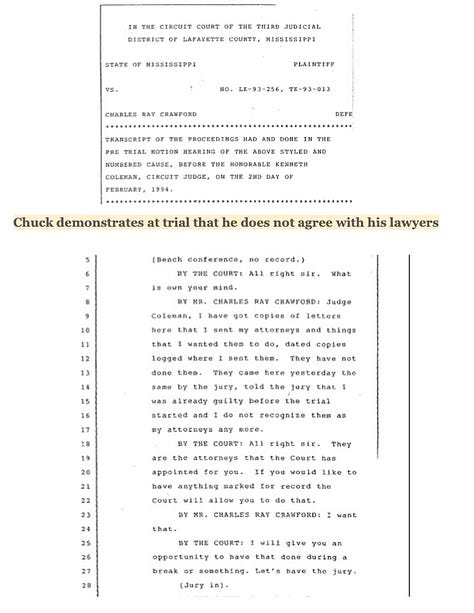
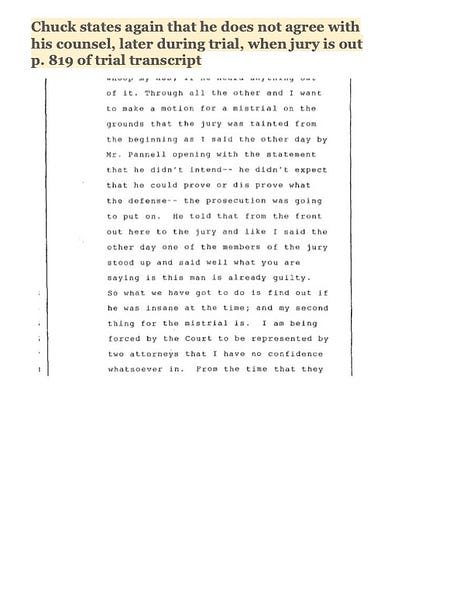
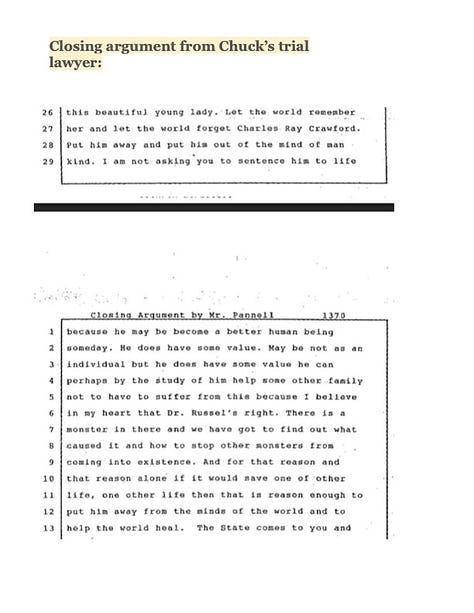
My lawyers disagreed. I received letters from one of them explaining very confidently that they would never come visit me. I filed with the courts; I told the judge, “Your honor, if you had my attorney in here and told me I could walk free if I could pick her out, I couldn’t do it.” I’ve redacted the names of these lawyers here, because it’s not just them who have done this to me; many lawyers do this to many of us on death row. If I had given that federal habeas lawyer $100,000, she would have been down here seeing me, talking to me on the phone. It’s all about the money.
Then, in 2014, I begged my lawyer at the time to follow up on some of the facts of my case. He wouldn’t do it. He refused to do it. I begged him and others in his office for years and they wouldn’t listen. It’s frustrating to have lawyers who are supposed to be representing you not listen to you about what to file. It’s not that these lawyers are evil. In the past, there were maybe only two or three lawyers in that office who were responsible for representing twenty to twenty-five people. They had to just throw something together and do the best they could with the resources they had.
That’s why I would file pro se. I just had to try to get somebody to listen to me. You can’t just sit here and let that happen: you have to do something. I would mostly do this when I felt my lawyers were leaving something out. Then I would have to go in and file something. It wouldn’t be effective, but I wanted to get it before the court, to preserve it, in case I got a lawyer later on who would pursue it. I have filed pro se motions and briefs in all of my appeals, including my direct appeal, my post-conviction appeals, and my habeas appeals. In all of my pro se motions, I stated that I wasn’t a lawyer, but I was doing my best. I can’t tell you how many times I would write something, tear it up, and write it again before sending it into file.
Filing pro se is extremely limiting, because you’re doing it from inside a prison cell. You basically have to rely on what’s already been produced in your case and challenge it that way. You can’t go out and question witnesses or look for evidence, and we don’t have computer access to look up cases. We have to rely on the law library to bring us stuff. And you’re writing it by hand. When I first started doing this years ago, we could get type writers off commissary. Because I could type, I filed a bunch of pro se stuff then. Starting around the 2000s we couldn’t have typewriters anymore; they just stopped selling them, along with the supplies you need for them. At that point, once you ran out of ribbons, you couldn’t buy more. Guys had typewriters for years after that, but they were no good because they couldn’t get more ribbons.
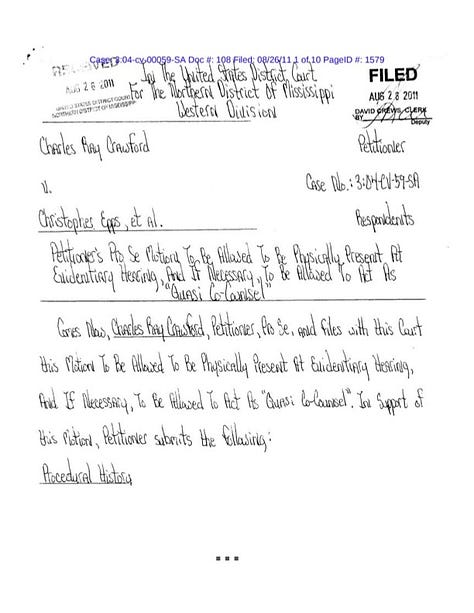
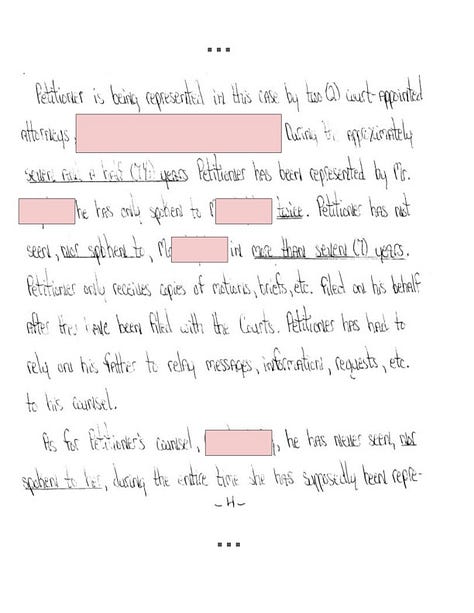
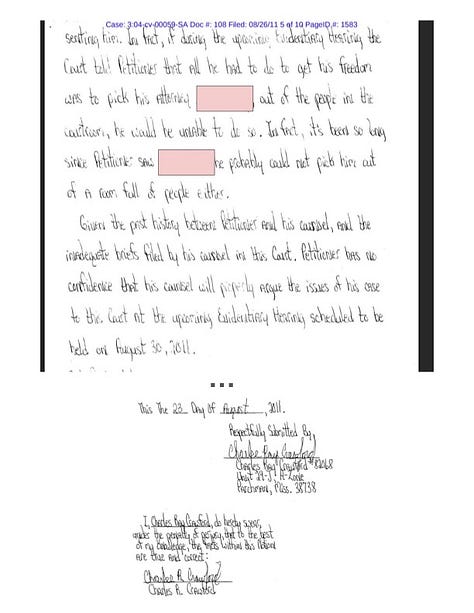
Whether you have a typewriter or write everything out by hand, when you file pro se, the court basically ignores you because you’re not a lawyer. But I won’t say it’s a waste of time, because there are a lot of pro so filings that have done a lot of good. A lot of people don’t know this, but your Miranda Rights? That was written on paper sacks from a guy in prison. It was a pro se defendant that got you your Miranda Rights.
Because my earlier lawyers wouldn’t include a lot of important issues in my filings, the judges can say, “This should have been brought up years ago, now it’s procedurally barred.” Worst of all, the way it’s written, they say “Crawford failed to do this…Crawford failed to do that…” That wasn’t me! That was my lawyers. Just like at my trial, when my lawyers claimed insanity when I opposed it. A judge wrote, “Had Crawford not chosen to go for the insanity defense, his case and conviction would have been overturned;”—but “Crawford” vehemently rejected the insanity defense.
When you get good people, though, they become like family. One of my current lawyers has been representing me for more than a decade, even after she moved away from Mississippi for another position out of state. She’s a real good lady. And my current lawyer has made sure a lot of the leg work that was supposed to happen years ago got done.
The Mississippi Supreme Court violated the law when they set my date. The state statute says the Supreme Court cannot set a date until all a defendant’s state and federal appeals have been exhausted, and I have one appeal left. In their response to my most recent filing, prosecutors didn’t say anything about the filing not having merit; they said it was procedurally barred. A man facing death should never have to think about time or procedure bars. Time and procedural bars are what people are going to have to start screaming about.
I stopped filing pro se back in 2014 when they were trying to set my execution date. It was too stressful and frustrating. I got sick and tired of filing this stuff and it not doing any good. That was when I started to turn everything over to God and rely on Him. I believe that He brought good people into my life, including my current counsel, to help me.
CHUCK: Part I, Working for a Living
"God's work tells us that if you’re a ditch digger, be the best ditch digger you can be; if you’re a doctor, be the best doctor you can be. I’m a prisoner—I’m gonna be the best prisoner I can be."
CHUCK: Part II, Belly of the Whale
"This is my whale’s belly. I didn’t do what God wanted me to do, so he put me in the belly of the whale. Now I do my best to be that witness for him."
CHUCK: Part III, What Crime Scene?
"If the prosecutors and investigators are fabricating evidence and putting it together to suit their story..how can you tell who is guilty and who is innocent?"





This is so messed up.